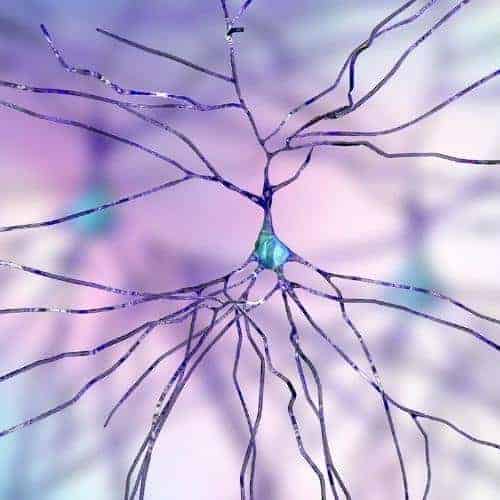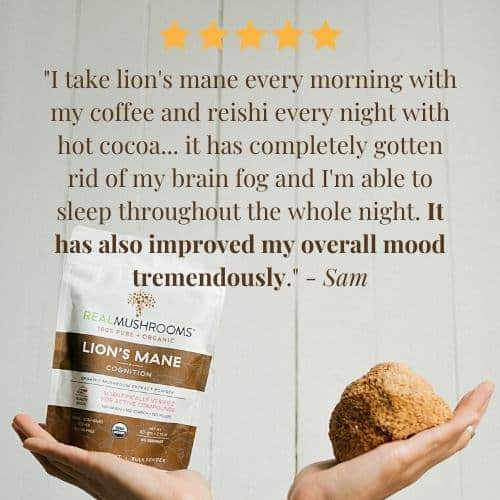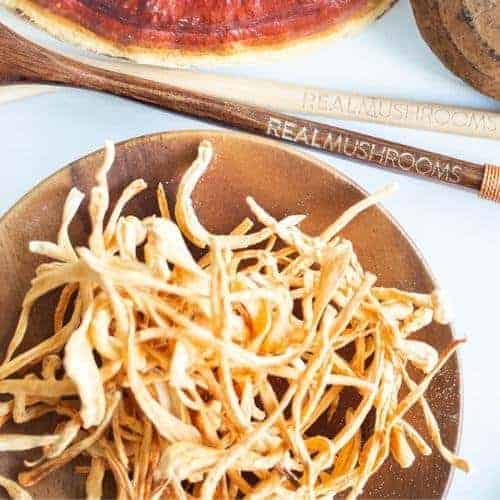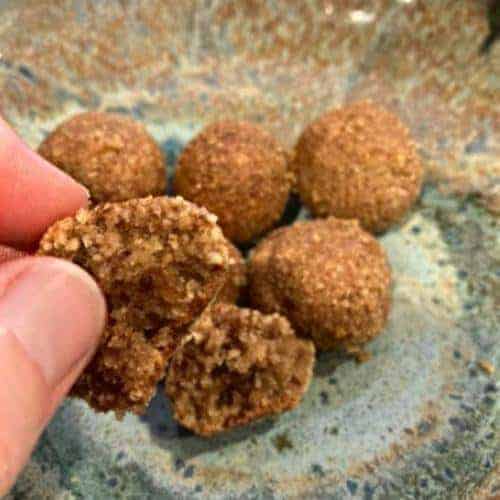Menu


Functional fungi can help balance the immune system, help with sleep, and give you a boost of energy. But what are the best mushrooms (fruiting bodies) for anxiety, and can mushroom supplements be calming to a worried mind?
“Stressed out” seems to be an all too common sentiment these days. If you find that you feel dread and apprehension even when there is no apparent stressor, you may have anxiety (1).
Left untreated, anxiety just breeds more of the same. As a result, anxiety may also increase your risk of chronic health conditions due to its impact on the autonomic nervous system (2).
The good news is you can do something about your anxiety. There are a variety of tools and methods that can help, and research suggests adaptogens, like functional mushrooms, can play a big role. Read on as we dive into how functional mushroom supplements can alleviate anxiety and the top 3 we recommend.
Let’s take a look at the three main ways functional mushrooms (fruiting bodies) help anxiety.
It was once a common assumption that the human brain stops developing once you reach your mid-20s. Essentially, the assumption was that the neurons you had at birth were what you were stuck with for life (3).
Scientists began challenging this dogma in the 1960s. And recent research confirms that a healthy adult brain continues making new neurons (4).
The process of generating new neurons — called neurogenesis — in the adult human brain appears to be limited to your hippocampus. This part of your brain is responsible for learning, memory, and emotions (5).
In fact, about 700 new neurons are added to your hippocampus every day (6).
The birth of new neurons appears to be connected to neuroplasticity. This is also known as your brain’s ability to reshape, adapt, and make new neural connections.
One neurobiology concept states that “neurons that fire together wire together.” Every time you experience anxiety in response to something new, the connection between that trigger and your anxiety gets stronger (7).
If neuroplasticity allows your neurons to create unwanted patterns, it may also be possible to harness its power to improve them.
Unfortunately, several intrinsic and extrinsic factors can affect neurogenesis, including (7,8):
Impaired neurogenesis in adults has been associated with neurological conditions (8).
Laboratory and animal studies are beginning to show that adaptogens can support neurogenesis (8,9,10). A healthy lifestyle supported by adaptogens in healthy mushrooms such as Lion’s Mane may help lift your mood and reduce anxiety (56).

Adaptogens such as functional mushrooms have demonstrated in recent studies that they can support the growth of new brain cells (neurogenesis) in the hippocampus. This part of your brain is responsible for learning, memory, and emotions.
You might have heard that mental health disorders are caused by chemical imbalances in the brain. But what does that mean?
It means that the balance of the chemical messengers in your brain, known as neurotransmitters, has been disrupted.
Your brain is home to hundreds of different types of neurotransmitters. In the past, anxiety research has focused on the neurotransmitter γ-aminobutyric acid (GABA). But we now know several other neurotransmitters play a role, including (11,12):
Anxiety, then, is not a hard-wired defect in your brain. Rather, it may be a deficit or overabundance of the chemical messengers that control your emotional responses.
The best mushrooms may increase your resistance to occasional anxiety-related stress by acting similarly to some neurotransmitters. The exact mechanism by which this occurs has not yet been identified. However, it is presumed that mushrooms for anxiety have some adaptogens that act via the pathway that mediates your body’s stress response (13).
Adaptogens are also mild stressors. Some researchers believe repeated exposure to mild or low stress levels can increase resistance to future stress exposure, potentially improving mental health (13). This therapeutic potential concept is also evident in the action of plant-based adaptogens such as green tea and rhodiola.
A key protective mechanism exerted by the best mushrooms for anxiety is their ability to regulate your immune system. This is how they help your body maintain an optimal, balanced state.
These properties are also critical for your body’s healthy inflammatory response.
Inflammation is a natural part of your immune system's response to damaging factors, such as injuries or harmful chemicals. This essential, temporary response leads to many symptoms you’re already familiar with — fever, pain, swelling, etc.
When your body’s inflammatory response goes awry, chronic inflammation can set in. The infiltration of inflammatory cells into the tissue site can lead to further tissue damage (14). Chronic inflammation may also be a mechanism for anxiety disorders (15,16,17,18).
Mushrooms are rich sources of compounds that support a healthy inflammation response, such as (19):
Some experts believe adaptogens like mushrooms could help counteract the “weight” of the stressor. As a result, they make it less likely that the body will fall into a stressed state (20).

Mushroom consumption, in general, appears to be linked to lower odds of mood disorders (21). Because depression and anxiety often appear together, taking mushrooms for anxiety may support an overall positive mood.
So, which mushrooms help with anxiety? Here are our top 3 best mushrooms for anxiety.
Reishi’s (genus Ganoderma) great reputation dates back thousands of years in many Asian cultures (22). Today, the most common reishi you’ll find is Ganoderma lucidum a.k.a. lingzhi. Traditional Chinese medicine (TCM) practitioners use reishi to (23):
Reishi’s health benefits are so revered that TCM physicians still call it “the mushroom of immortality” (24).
But how well does this king of the best mushrooms hold its own against modern scrutiny?
It may not be able to grant you immortality, but scientists have confirmed a myriad of benefits that could contribute to a long, healthy life. So far, over 400 different compounds have been identified that may assist the body in various ways. They include (25):
Research suggests that some of these compounds have brain-protecting properties that could improve mental health. In one study, scientists investigated the potential of reishi to alleviate anxiety in mice. The mice that were given reishi extracts were able to stay much longer in the elevated plus maze (EPM). EPM is a commonly used measure of rodent anxiety (26).
In another mouse study, reishi extract showed a sedative effect on the central nervous system. Researchers observed that mice given reishi extract exhibited behaviors indicating less anxiety compared to those who weren’t given any (27).

Living with chronic conditions can trigger anxiety and depression (28). In some cases, anxiety is a secondary symptom to another, such as fatigue.
This appears to be the case in many women with breast cancer. Patients with breast cancer often report cancer-related fatigue (CRF). In some cases, CRF can lead to anxiety-related emotional distress. One study of 48 patients found that Reishi promoted a better overall quality of life, including lower anxiety, potentially improving mental health (29). These findings support using reishi mushrooms for anxiety.
Sleep and anxiety have a two-way relationship. When you’re constantly feeling anxious, falling asleep can be a challenge. But lack of sleep can also impact your emotions, including occasional anxiety and impacting stress levels. Reishi mushroom may be able to reduce the time it takes for you to fall asleep, thereby increasing your sleep time and supporting mood regulation.
A mouse study suggests that reishi mushrooms may impact a pathway associated with serotonin and gut bacteria (30). It also appears that reishi has GABAergic activity, the system responsible for regulating sleep (31).
By promoting higher-quality sleep, reishi may soothe occasional anxiety and anxiety-related stress, possibly influencing mental health positively.
It may not be surprising to think that there’s a connection between nutrition and mental health. Several studies suggest improving your diet may help support a positive mood (32,33).
There is a possible link between blood sugar levels and mental health outcomes. Consumption of foods with a higher glycemic index is correlated with increased odds of anxiety and other mental disorders (34,35).
Maintaining balanced blood sugar levels could help relieve occasional worry and stress, potentially improving mental health. Decreasing the odds of high and low blood sugar is an important strategy when addressing potential triggers of occasional worry and blue mood.
Research suggests beta-glucans, like those from the best mushrooms, may help keep your blood sugar levels steady (36).
A study with mice showed Reishi mushroom polysaccharides can regulate expressions of certain proteins associated with uncontrolled blood sugar levels. The polysaccharides also showed protective properties toward pancreatic beta-cells (37).
It’s important to note that most blood sugar research performed on functional mushrooms are animal or laboratory (cell) studies. So, while many of the findings are promising, clinical trials will need to be conducted to confirm their benefits in humans.
Find out more about reishi in Reishi Mushroom Benefits & Usage: A Comprehensive Guide.
When talking about functional mushrooms and neurological health, we can’t leave out Lion’s Mane.
The scientific name of Lion’s Mane mushroom, Hericium erinaceus, alludes to the two most well-studied compounds found in this species: hericenones and erinacines. Research studies suggest that these compounds in Lion’s Mane may improve brain function and protect against normal cognitive decline related to aging (38).
Let’s examine why some clinicians call Lion’s Mane the brain and nervous system mushroom (39).

Lion's mane is thought to affect the release of stress hormones and may help balance the body's response to stressors, potentially improving mental health (69). A 2018 animal study on restrained mice showed chronic administration of 400 mg/kg Lion’s Mane mycelium extract helped restore their levels of dopamine, serotonin, and norepinephrine, which had previously been reduced (40).
Serotonin and dopamine, known as “happy hormones,” play key roles in your mood and appetite, among other things. In general, researchers believe that low levels of serotonin and dopamine are connected to occasional worry, blue mood, and other mood disorders.
The mice that weren’t given Lion’s Mane showed significant decreases in dopamine and serotonin after repeated stress exposure (40).
The study's research team also noted that the mice given Lion’s Mane had a healthier inflammatory response. The mice not given Lion’s Mane showed elevated levels of inflammation after stress exposure (40).
Scientists are still learning how Lion’s Mane impacts serotonin and dopamine levels. It’s possible that they are a result of the mushroom’s effects on your gut microbiome. The trillions of bacteria in your digestive tract produce a wide range of neurotransmitters, including dopamine and serotonin (41). Some research suggests they may have a role in anxiety and depression (42).
In 2017, Sheng and colleagues reported that the polysaccharides found in Lion’s Mane act in the intestines (43). Another study showed that a protein from Lion’s Mane could help regulate the gut microbiome composition (44). Traditionally, Lion’s Mane is used for digestive disorders and complaints, being a tonic for the organs responsible for digestion.
The nerve growth factor (NGF) and brain-derived neurotrophic factor (BDNF) play important roles in neurogenesis.
In animals, changes in the levels of the nerve growth factor and BDNF are associated with neurodegeneration and psychiatric disorders (45,46,47,48). They also participate in brain plasticity (the ability to form new neural connections), particularly during development (49).
We don’t precisely know yet how NGF relates to health and medical conditions. However, studies on NGF deficiency have shown them to be correlated with anxiety-like behaviors in humans and animals. NGF-deficient mice exhibit increased anxiety, impaired spatial learning and memory, and decreased neurogenesis (50). In humans, reduced NGF levels have been observed in subjects with major depression, which is often linked to anxiety (51).
NGFs cannot penetrate the blood-brain barrier without help (52). This is where Lion’s Mane comes in. Both hericenones and erinacines easily cross the blood-brain barrier. Laboratory and animal studies also show they have qualities that protect your neurons and nerves. They are also able to enhance NGF activity (38,53).
Isoindolinones are unique, lesser-known neurotrophic compounds found in Lion’s Mane mushrooms. The isoindolinone derivative isohericerinol A found in Lion’s mane has been shown to increase neurite outgrowth via NGF synthesis and BDNF upregulation. Isohericerinol A joins the existing compounds known to induce NGF and modulate BDNF at an in-vitro level. These other existing compounds include: corallocin A, hericerin, hericenones and erinacines (67).
A 2018 mouse study suggested that encouraging hippocampal neurogenesis could have mood-enhancing effects and potentially improve mental health. The mice given Lion’s Mane mushroom extracts showed less anxiety and improved mood during their assessments (54).
Evidence from human clinical trials also supports this hypothesis. In a 2010 study, 26 patients were asked to eat 4 cookies per day containing either Lion’s Mane mushroom or placebo. Those taking Lion’s Mane scored lower on several measures, including an anxiety score (55). Therefore, taking mushrooms for anxiety can be beneficial in lifting one’s moods.
Another trial assessed whether a mixture of Lion's Mane mushroom and mycelium could improve mood in patients with obesity or who are overweight. At the end of the 8-week trial, the overweight participants in this study who received Lion’s Mane reported significant improvements in their mood. They also had higher circulating pro-BDNF, a BDNF precursor. These findings suggest that BDNF could be a biomarker for mood disorders, further supporting the use of mushrooms for anxiety (56).
Interested in learning more about Lion’s Mane? Check out Lion’s Mane Mushroom Benefits: A Complete Supplement Guide.
Cordyceps are a group of mushrooms that include over 400 different species. The two most well-known species are Cordyceps sinensis and Cordyceps militaris.
In TCM, Cordyceps mushrooms were used to strengthen the lungs and kidneys. It was also used to enhance sexual function and libido.
Cordyceps may also have the potential to boost your mood. Preliminary human and animal studies suggest cordyceps help support a healthy inflammation response (57,58,59,60). In theory, a healthy inflammation response may help alleviate occasional anxiety and stress and have potential mental health benefits. These findings support the use of mushrooms for anxiety.
Animal research suggests cordyceps mushrooms can help keep blood sugar levels steady (61). This effect appears to support a positive mood in mice (62). Further evidence will be needed to confirm the benefits in humans, but indications suggest mood-lifting properties when using mushrooms for anxiety.
Other animal research suggests Cordyceps may act on stress-related pathways in the brain. A 2021 publication reported that rats given Cordyceps didn’t show abnormal behavior from stress exposure, indicating stable mental health (63). Another report presented evidence that Cordyceps might act on important protein targets and their signaling pathways. The research team suggested regulating these targets and their pathways could support mood stability potentially providing mental health benefits (64).

Cordyceps may help counter oxidative stress caused by occasional anxiety and stress. Cell studies showed increased survival under stress when a Cordyceps treatment was applied (65). Cordyceps may also help balance circadian rhythms due to a unique compound called cordycepin.
A mouse study showed a 60% improvement in jet lag recovery when using cordycepin. Therefore, using cordyceps extracts may help address the impact of social jet lag (lack of sleep) on anxiety, mental health, and overall well-being (68).
Ready to learn more about Cordyceps mushrooms? Read our comprehensive guide, Cordyceps Mushrooms: Supplement Types & Health Benefits.
It’s a good idea to take functional mushrooms long-term to experience the benefits they have to offer for anxiety. Three months is the minimum recommended time to give a new supplement regime a chance to work.
But it’s also important to ensure you only consume the highest-quality supplements. What does this mean?
When buying mushrooms for anxiety, make sure that the supplement is actually made from the mushroom (fruiting body). The mushroom is where you can find an abundance of beneficial compounds like beta-glucans.
Avoid products made of mycelium since this fungal “root system” is commonly grown on a grain substrate, and this grain is not fully consumed by the mycelium and ends up in the final product. Therefore, the end product has diluted functional value (meaning less health benefits) and undesirable grain fillers. To learn more, check out our article Medicinal Mushroom Benefits: Mycelium vs. Fruiting Body.
Ensuring high quality is especially important when it comes to Reishi mushrooms. A 2017 article published in the journal Nature raised alarm about Reishi mushrooms. In this study, only 5 out of the 19 reishi mushroom samples, 26%, actually contained what was on their labels (66). That means a whopping 74% of the “reishi” supplements didn’t contain authentic Reishi.
At Real Mushrooms, we take pride in the sourcing and extraction methods for our functional mushroom products. Our products are guaranteed to contain no fillers, starch, or grains. This is all so you can experience the most benefits from functional mushrooms.
Learn more by reading our articles on Reishi, Lion’s Mane, and Cordyceps.
Here are some convenient and creative recipes for our Reishi 415, Lion’s Mane, and Cordyceps powdered extracts. You can add the mushroom powder to your coffee, tea, or one of the following healthy recipes. Alternatively, you can simply take your mushroom supplements in capsule form.
Help kickstart your immune system into gear and support a healthy inflammation response. This mushroom elixir features our Reishi, Lion’s Mane, and Cordyceps extracts

“Healthy” doesn’t exactly come to mind when we think of donuts. But what if they could be? Our keto-baked donuts with Lion's Mane extract are a great way to excite your taste buds. It can support a positive mood and relieve occasional stress.

Skip the coffee and prepare your brain for the day with our morning golden milk instead. The combination of lion’s mane, ashwagandha, and others will keep you returning for more.
Honestly, what’s better than sipping a warm, soothing golden milk while you sit back and relax after a long day? Reishi can help your body adapt to occasional anxiety-related stress and improve your sleep. Try it in our evening golden milk recipe.
Yes, you read that right. Healthy shouldn’t mean tasteless; we’re big fans of tasty foods. When your anxiety makes you want to stay in, try some self-care with this goodie. This ice cream shake features our Lion’s Mane and Cordyceps extracts.
Anxiety can make you feel like you’re losing control of yourself. A healthy lifestyle incorporating the best mushrooms may gently steer the body onward, alleviate occasional worry, and impact stress hormones. If you experience severe anxiety, it’s important to seek professional help.
If you’re looking for the best mushrooms for anxiety, we recommend Reishi, Lion’s Mane, and Cordyceps.
Real Mushrooms is confident in the safety and efficacy of our products. We recommend that you consult your physician before starting any new supplement.

Disclaimer: The information or products mentioned in this article are provided as information resources only, and are not to be used or relied on to diagnose, treat, cure, or prevent any disease. This information does not create any patient-doctor relationship, and should not be used as a substitute for professional diagnosis and treatment. The information is intended for health care professionals only. The statements made in this article have not been evaluated by the Food and Drug Administration. Any products mentioned are not intended to diagnose, treat, cure, or prevent any disease. The information in this article is intended for educational purposes. The information is not intended to replace medical advice offered by licensed medical physicians. Please consult your doctor or health practitioner for any medical advice.